1995 D-Z R
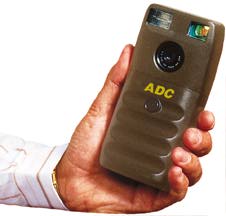
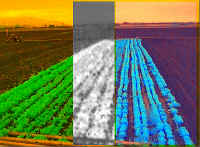

DYCAM Agricultural
Digital Camera (ADC) - 1995. The
ADC was a portable digital camera specifically tailored for multi-band
photography in the visible red and near-infrared. The camera and
software allowed calibration for the ambient conditions and applied the
calibration value to all images made under the calibrated
conditions. The 24-bit color image from the camera was evaluated
by the host software as one of the three supported vegetation indexes
(VI). The processed VI image directly represented the result of the
index equation used on a pixel-by-pixel basis. The resulting
8-bit image could be palletized, saved and exported for use with other
software. The purpose of the images was to evaluate the condition of
crops, especially as to lack of or excessive ground moisture. Similar,
but much more advanced systems are still used today.
http://camera-wiki.org/wiki/Dycam
http://camerapedia.wikia.com/wiki/Dycam
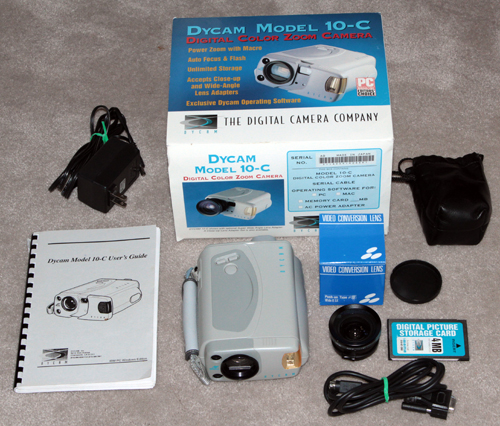

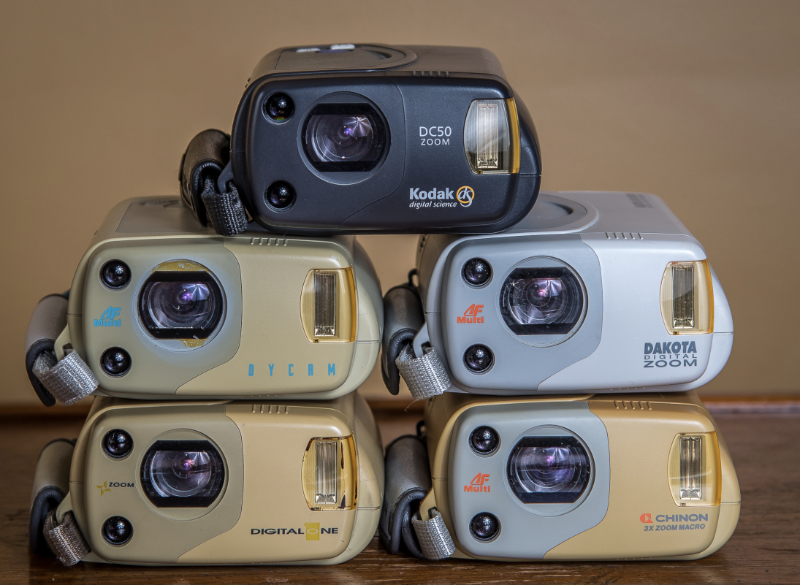
DYCAM
10-C - (Kodak DC-50 Zoom, Ritz Dakota DCC-9500, Promaster DigitalOne, Chinon ES-3000) - 1995. Chinon OEM. 640
x 480 CCD. ISO 84. 38mm to 114mm zoom f/2.8
lens.
Shutter 1/16 to 1/500 second. In-camera storage of 64-192
images or 4MB flashcard. Dycams are not often seen on eBay as very
few were sold.
Even rarer is the above camera we purchased complete in its original
box with all accessories and original manual, including an optional
wide-angle lens. MSRP $950.
http://camera-wiki.org/wiki/Dycam
https://www.digicammuseum.de/gechichten/erfahrungsberichte/logi-fotoman-pixtura-iichinon/
http://www.photographyreview.com/product/cameras/digital-cameras/3-megapixel/dycam/10-c.html
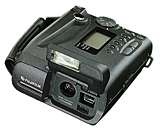
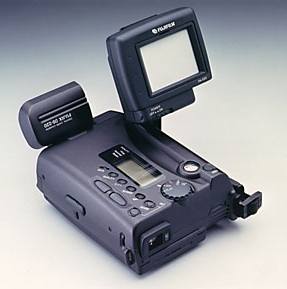


FUJI
DS-220 - 1995. Auto
focus, power
zoom
36mm to 72mm lens, built-in flash. 640 x 480 pixel CCD.
First digital camera to use Lithium ion batteries. MSRP
$995. (Rare on eBay)
https://www.digitalkameramuseum.de/en/cameras/item/fujifilm-ds-220
https://www.digitalkamera.de/Kamera/Fujifilm/DS-220.aspx
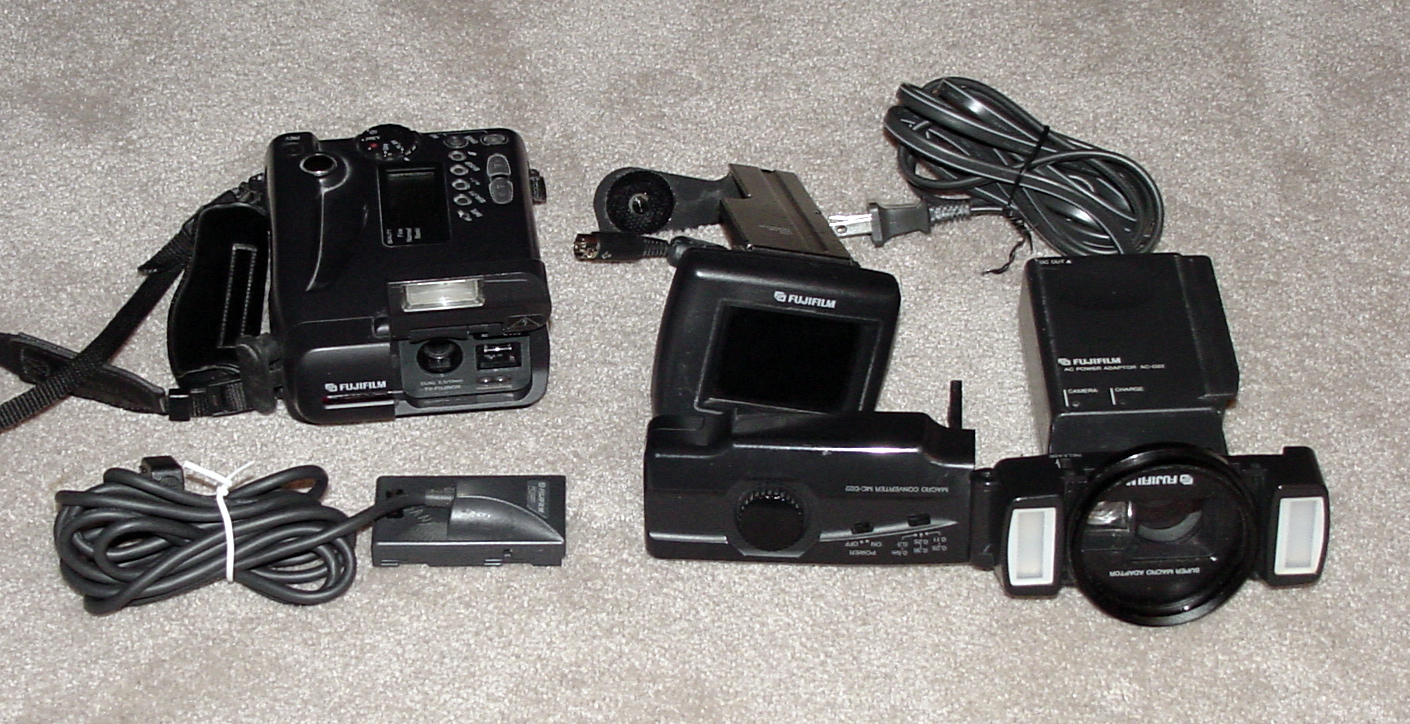



ORTHO-TECH NEWS, June
1997
FUJI DS-220 DENTAL/MEDICAL SYSTEM- 1995. Not
something you come across everyday on eBay. This camera is equipped
with a close-up lens and flash as well as an LCD. It was used for
closeup work in denistry. This camera preceded the SciCan DynamaX
camera (marketed 1996) which was a Kodak DC40 with similar closeup lens and
flash
(see below). ORTHO-TECH NEWS of June
1997 states that the Fuji DS-220 "is the first
camera that is actually manufactured for dedicated dental and medical
applications." The complete system listed for $2,999. (EXTREMELY RARE ON U.S. eBay).
https://www.kupindo.com/Fotoaparati-i-kamere/20757481_FujiFilm-PA-D22-Fujix-Color-LCD-Monitor
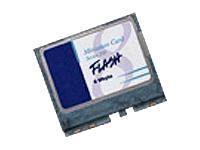
INTEL Miniature Card - 1995. Miniature
Card or MiniCard is a flash memory card standard first promoted by
Intel Corp. in 1995 and backed by Advanced Micro Devices, Fujitsu and
Sharp Electronics. The Miniature Card is 37 x 45 x 3.5 mm thick and can
have devices on both sides of the substrate. The Miniature Card format
competed with SmartMedia and CompactFlash cards, also released during
the mid-1990s. Although they were all significantly smaller than Type I
PC Cards, the CompactFlash and SmartMedia cards were more successful in
the consumer electronics market.
http://en.wikipedia.org/wiki/Miniature_Card
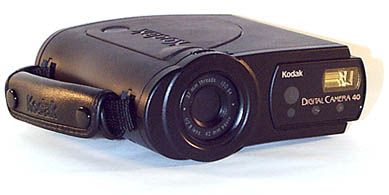
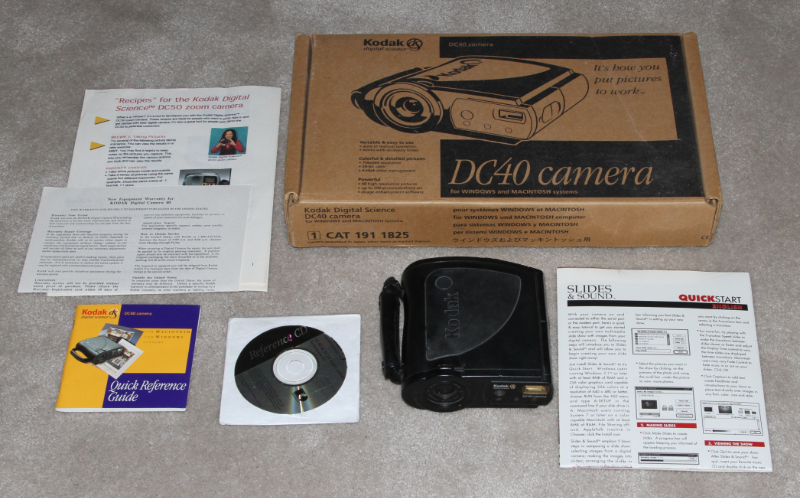

KODAK DC 40 - 1995. 756 x 504 pixel CCD. ISO 84. 4MB internal memory. 42mm,
fixed-focus
lens. Shutter 1/30 to 1/175 second. MSRP $995.
http://camera-wiki.org/wiki/Kodak_DC40
https://www.digicammuseum.de/gechichten/erfahrungsberichte/logi-fotoman-pixtura-iichinon/
https://en.wikipedia.org/wiki/Kodak_DC_Series
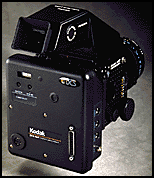
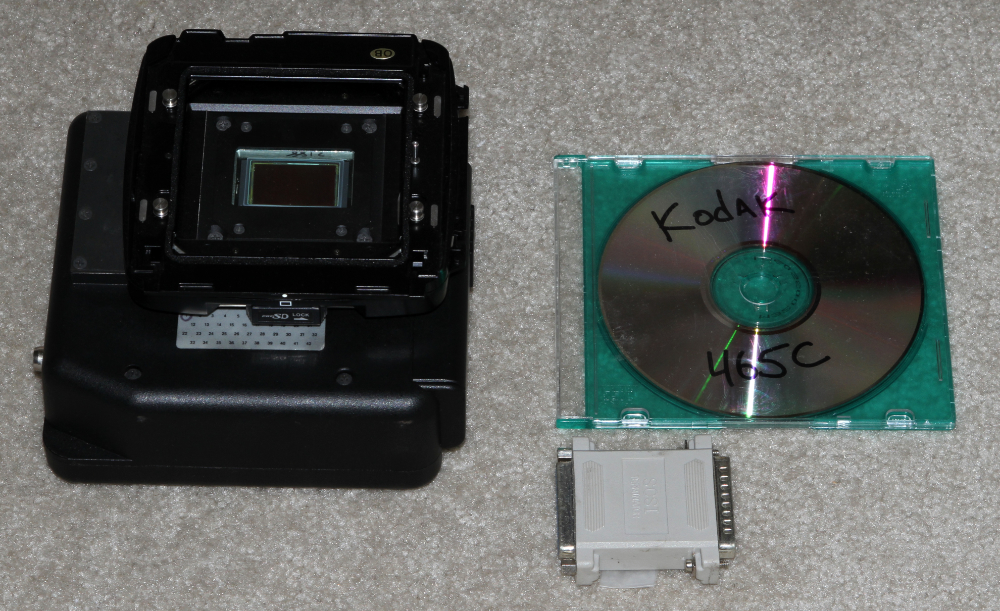
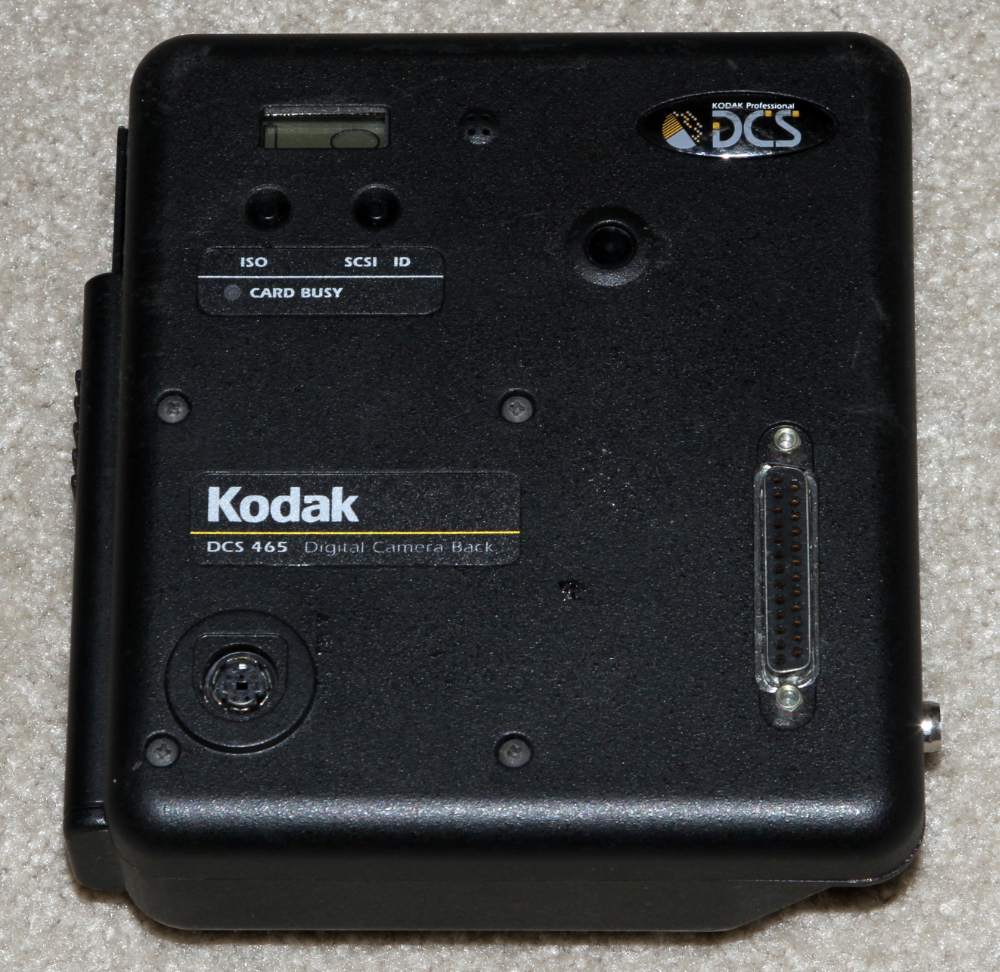
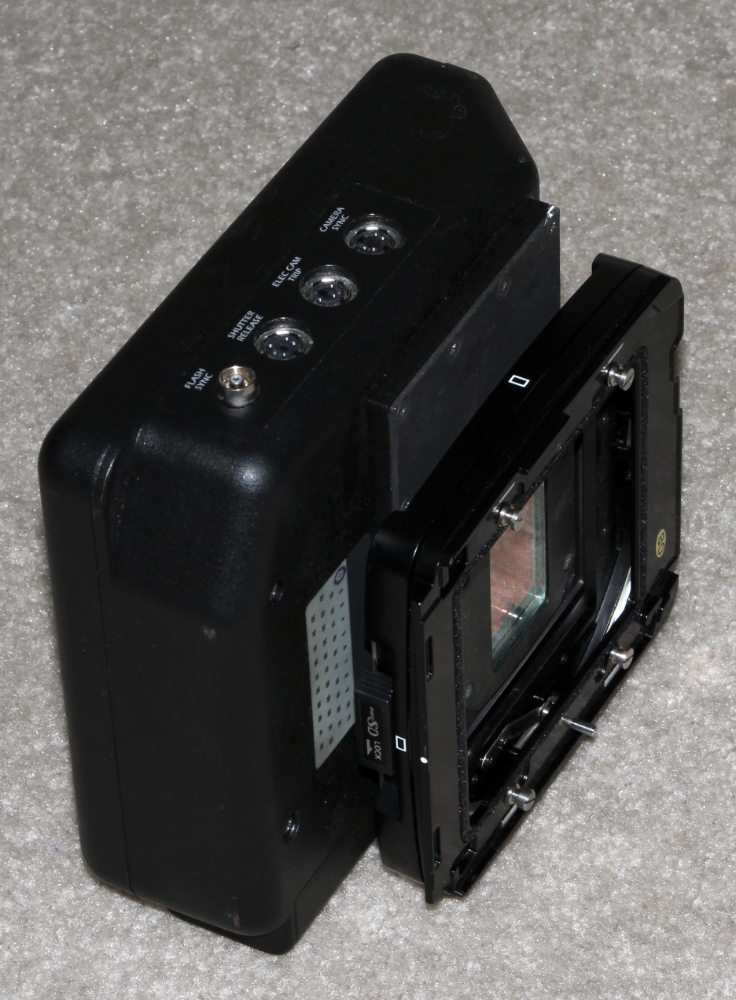
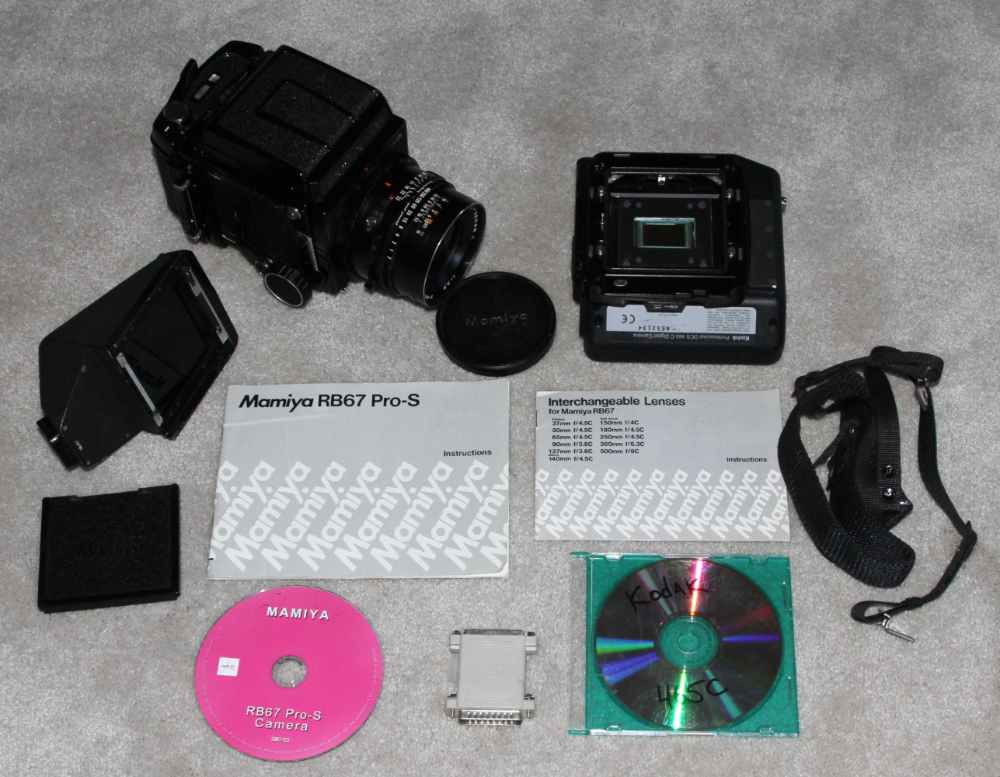

KODAK
DCS 465c(color)/m(monochrome) DIGITAL BACK - 1995. Example of
a digital camera back for medium-format cameras. Designed to fit
the back of the Hasselblad 500/503 and Mamiya RB/RZ67 cameras (Mamiya RB67 above).
The
465c used a color filter wheel which rotated between exposures. A
built-in microphone allowed the photographer to annotate images before
or after shooting. ISO 100-400. 4080 x 4080; 12-bit color
CCD. Compact Flash or 256MB DRAM. Digital Photography, David Busch, 1995,
p49. See
Mamiya RB67 on our 1974 page. About 200 digital backs were
produced of varios types- color, B & W, and Infrared. MSRP $27,500 for the digital back ($57,000 in 2024 dollars). Although only about 200 Kodak
digital backs were marketed, we were able to purchase the above sample
for a small fraction of what some sellers are now demanding for cameras
that sold in numbers of 1,000 or more.
https://www.digitalkameramuseum.de/en/cameras/item/kodak-dcs-465
http://www.mir.com.my/rb/photography/companies/Kodak/index1.htm
http://www.outbackphoto.com/reviews/equipment/kodak_645c/proback_645c.html
http://manualzz.com/doc/2066118/kodak-645-digital-camera-user-manual
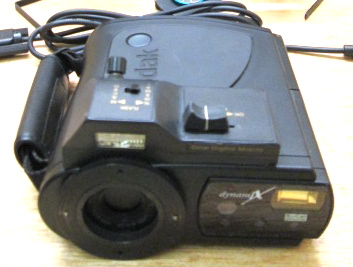
SCICAN DYNAMIX / KODAK DC-40 DENTAL CAMERA -
1995/96. Like
the Fuji DS-220 dental camera system above, the DynamiX had special closeup
lenses and flash attachment especially for dental work. But
unlike the Fuji, did not include an LCD. It actually became in
use in 1996 which is the date of the SciCan announcement.
http://www.epi-centre.com/reports/9604ihs.html
https://www.digitalkameramuseum.de/en/cameras/item/dynamix-digital-macro-camera
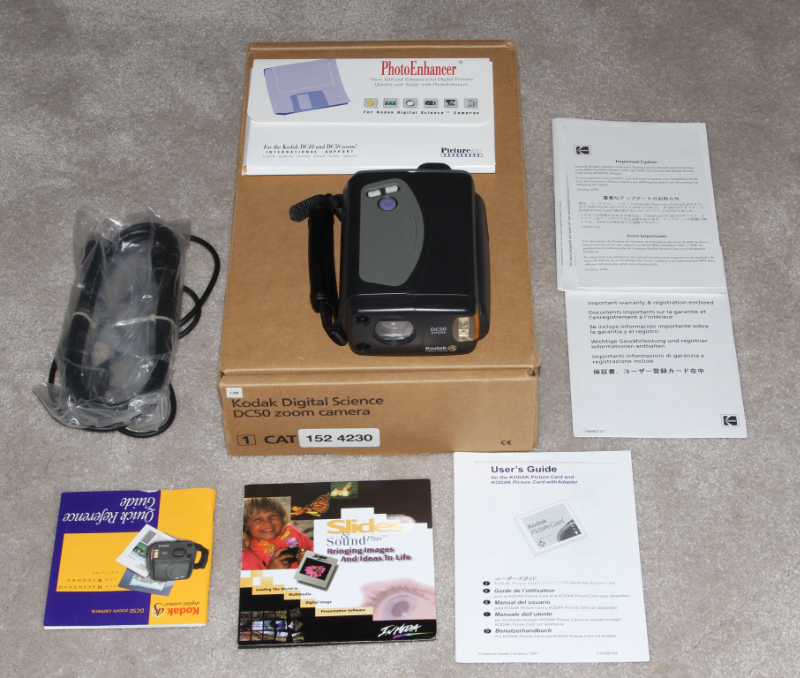


KODAK
DC-50 ZOOM (Chinon ES-3000, Dycam 10-C, Promaster DigitalOne, Quantaray/Ray Enterprises/Ritz DCC-9500) -
1995. Chinon OEM. 756
x 504 pixel CCD.
ISO
84. 38mm to 114mm zoom f/2.8 lens. Shutter 1/16 to
1/500
second. In-camera storage of 64-192 images. MSRP $995.
https://en.wikipedia.org/wiki/Kodak_DC_Series
https://www.digicammuseum.de/gechichten/erfahrungsberichte/logi-fotoman-pixtura-iichinon/
http://camera-wiki.org/wiki/Kodak_DC50_Zoom
http://www.photographyreview.com/cat/cameras/digital-cameras/3-megapixel/kodak/dc-50/prd_82642_3098crx.aspx
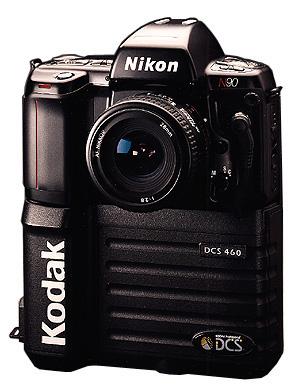

KODAK
DCS 460 - 1995. Based on the
Nikon
N90S. The
DCS 460 used the same design as the DCS 420, but integrated a CCD chip
of 6 million of pixels (2036 x 3060 pixels). Images were 18MB and
were coded on 12 bits. There were three versions of the DCS
460: DCS 460 c (color), DCS 460 m (black and white), DCS 460 ir
(infrared).
MSRP $28,000. Digital Photography,
David Busch, 1995, p49.
http://www.mir.com.my/rb/photography/companies/Kodak/index1.htm
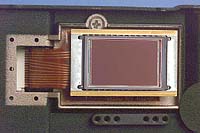
Kodak DCS 460 CCD
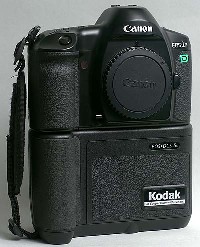
KODAK EOS DCS 5/Canon 1n - March 1995. Canon 1n film camera with dikgital back. Models
- color: EOS-DCS 5c; black-and-white: EOS-DCS 5m. ISO: color:
100-400; black-and-white: 200-800. 1524 x 1012 pixel CCD.
Shutter 1/30 to 1/8,000 second.
https://en.wikipedia.org/wiki/Canon_EOS_DCS_5
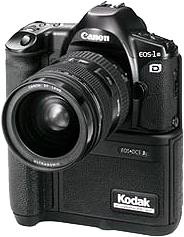
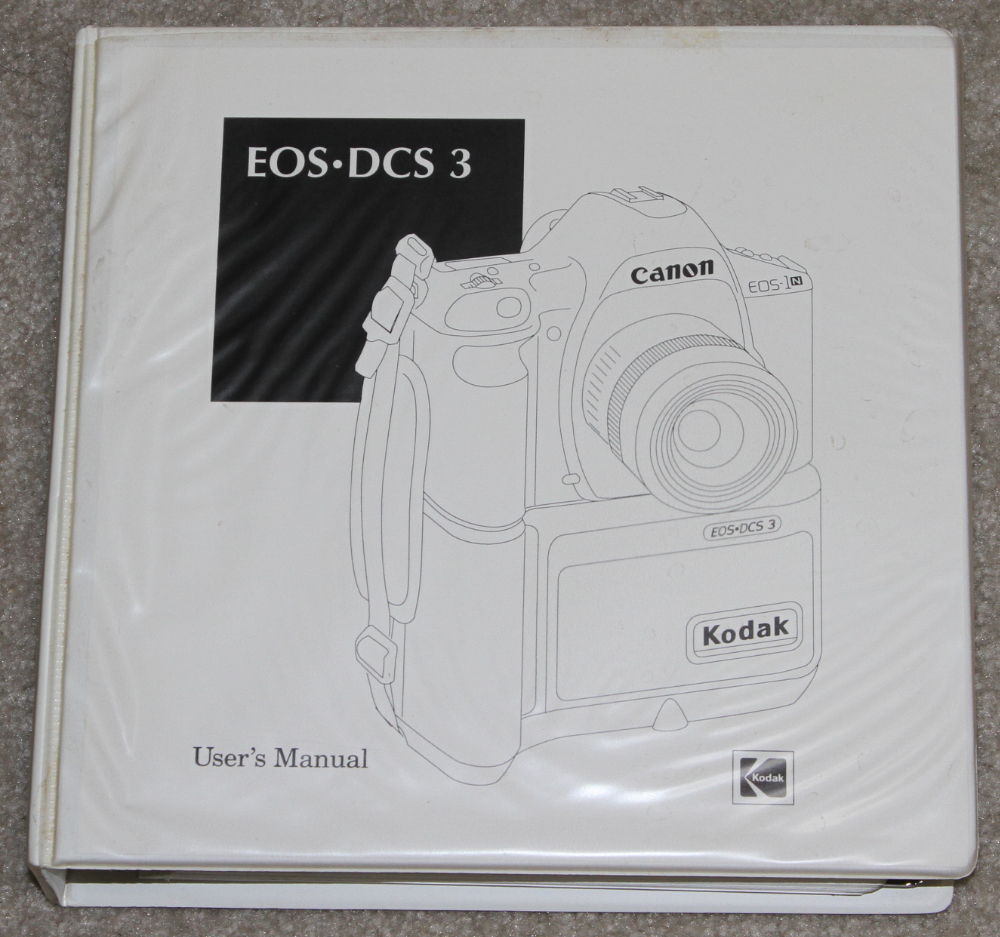

KODAK / CANON EOS DCS 3 - July 1995. Based
on the Canon EOS-1N. Focal-plane shutter multi-mode AF SLR
digital camera with 36-bit full color (RGB each 12 bits). Imaging
element size: 16.4 x 20.5 mm. 1.3 megapixel CCD (1268 horizontal x 1012
vertical pixels). ISO 200 to 1600 (color) and 400 to 6400
(B&W). Several models. Color: EOS-DCS 3c;
black-and-white: EOS-DCS 3m; infrared: EOS-DCS 3ir. ISO: color:
200-1600; black-and-white: 400-6400; infrared: 400-6400. 1268 x
1012 pixel CCD. Shutter 1/30 to 1/8000
second. Only about 1,000 were marketed. Digital Photography,
David Busch, 1995, p50.
http://global.canon/en/c-museum/product/dslr775.html
https://www.digitalkameramuseum.de/en/cameras/item/kodak-eos-dcs-3?category_id=459
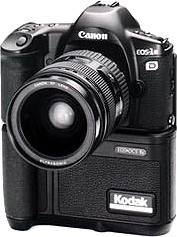
KODAK/ CANON EOS DCS 1 - December 1995. Focal-plane
shutter multi-mode single-shot AF SLR digital camera with 36-bit color
(RGB each 12 bits). Imaging element size: 18.4 mm (H) x 27.6 mm
(W). Six megapixel CCD (3,060 horizontal x 2,036 vertical
pixels). A 340 megabyte hard disk card allowed 53 high-resolution
images to be stored. The camera was compatible with more than 40
EF lenses. ISO 200 to 1600 (color), 400 to 1600 (B&W and
IR). Shutter 1/30 to 1/8000 second.
https://en.wikipedia.org/wiki/Canon_EOS_DCS_1
http://www.mir.com.my/rb/photography/companies/Kodak/index2.htm
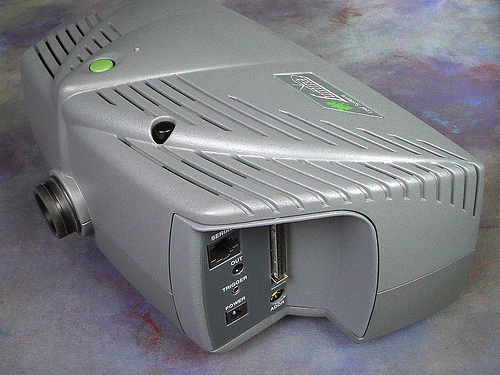
LEAF LUMINA - 1995. The
Leaf Lumina by Leaf Systems Incorporated was a digital SCSI scanner
camera used with a 35 mm Bayonet F-Mount Nikon lens. As a
scanning camera, it was used for studio still image photography.
MSRP $4995 ($31,000 in 2009 dollars).
http://www.epi-centre.com/reports/9403adi.html
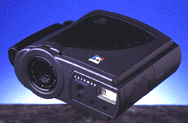
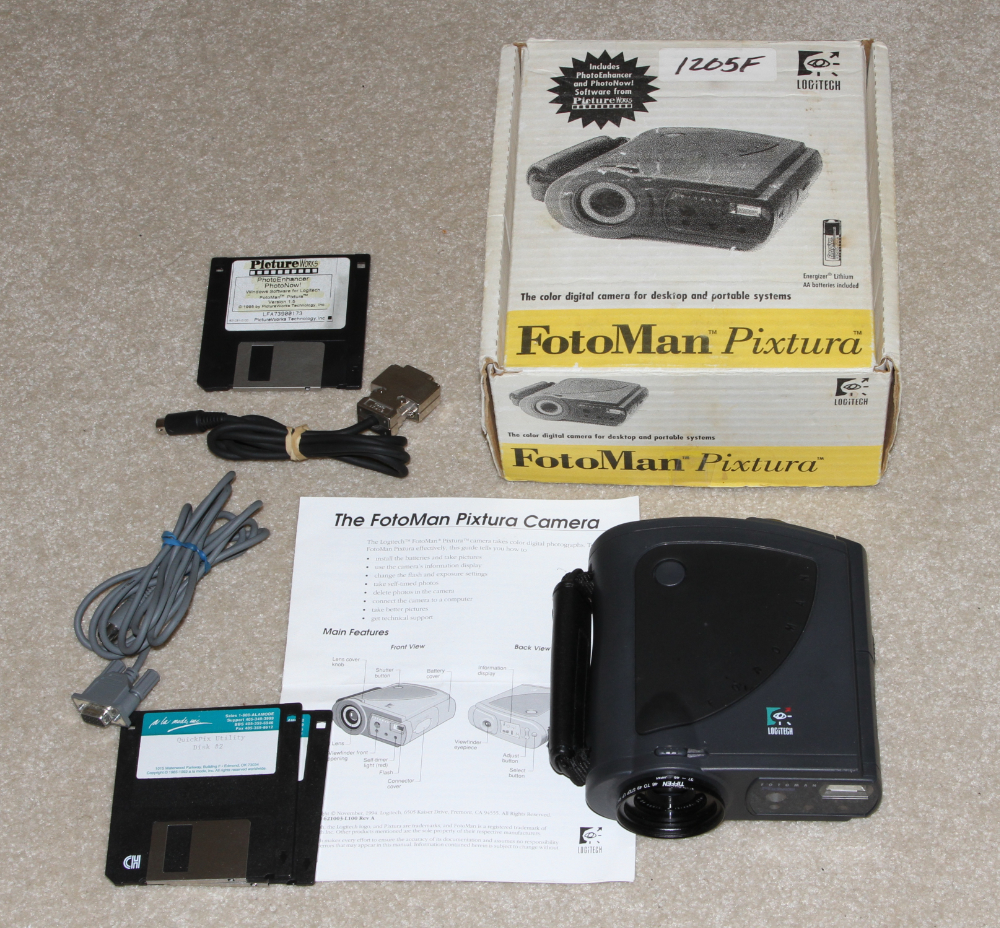

LOGITECH
Fotoman Pixtura (Kodak DC-40) - 1995. 756
x 504 pixel CCD. ISO 84. 4MB internal memory. 42mm,
fixed-focus
lens. Shutter 1/30 to 1/175 second. MSRP $995. (Rare on U.S. eBay)
https://www.digicammuseum.de/gechichten/erfahrungsberichte/logi-fotoman-pixtura-iichinon/
http://camera-wiki.org/wiki/Logitech
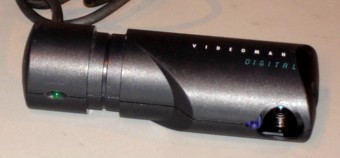


LOGITEC VIDEOMAN - 1995. Logitech
introduced VideoMan, its first Web camera, meant for sending live and
recorded video over the Internet. The Logitech VideoMan was the first
color digital-video camera for the personal computer. 640 x 480 pixel
image, and a 30-frame-per-second operation. (Rare on U.S. eBay)
https://www.sourcewatch.org/index.php/Logitech
https://www.digicammuseum.de/gechichten/erfahrungsberichte/logi-fotoman-pixtura-iichinon/
https://www-techbox-sk.translate.goog/znacky-logitech-historia-a-sucasnost-najuspesnejsieho-vyrobcu-periferii?_x_tr_sl=sk&_x_tr_tl=en&_x_tr_hl=en&_x_tr_pto=sc&_x_tr_hist=true
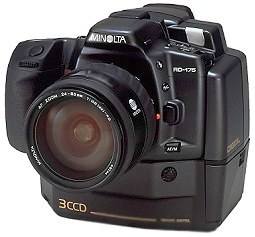

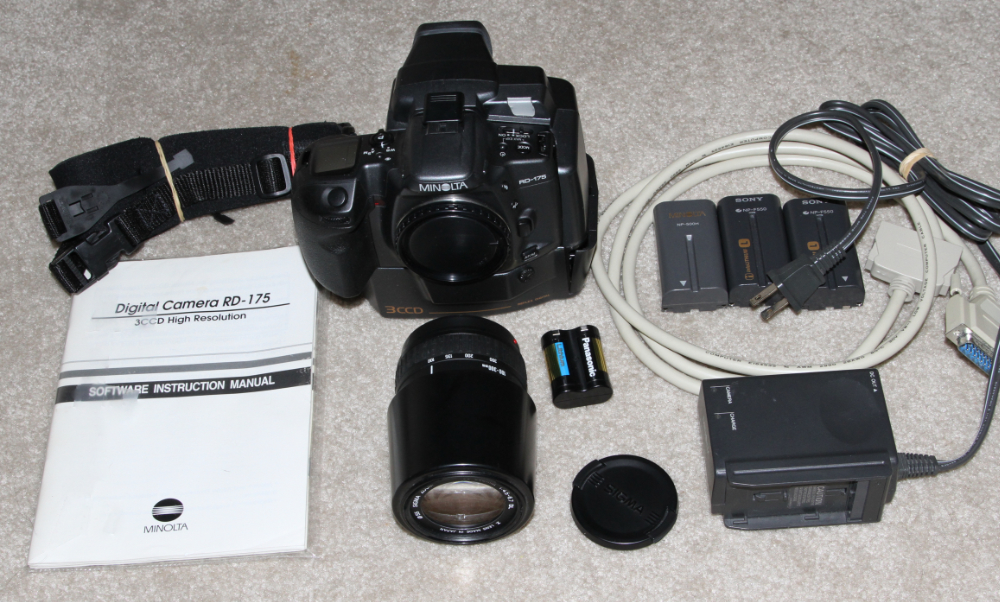

MINOLTA
RD-175 (Agfa ActionCam) - 1995. Professional/prosumer
SLR digicam, first ever portable digital SLR camera. Based
on the Minolta Maxxum 500si body. Resolution = 1528 x 1146
(optical
beam splitter with three 380K pixel CCDs - first of its kind for a digicam). ISO 800.
Interchangeable
lens. Shutter 1/2 to 1/2000 second. Built-in flash and
self-timer.
MSRP $13,500. (Common on U.S. eBay, but asking prices vary from $1,000 to $5,000).
https://contrastly.com/the-evolution-of-photography/
http://www.epi-centre.com/reports/9605cs.html
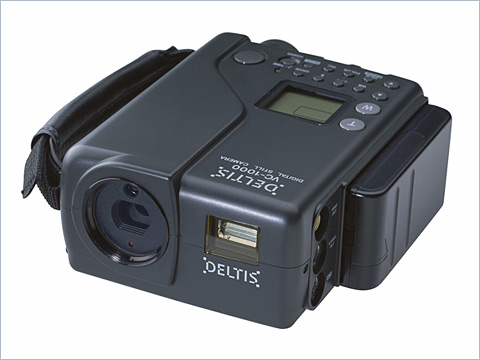
OLYMPUS
DELTIS VC-1000 II, VC-1100 II, VC-1100 II HS - 1993-95. 1/2-inch768
x 576 CCD. 54mm to 108mm f/4 lens. Shutter 1/8 to 1/10,000
second. The various models were similar, but some had
transceivers for phone use, different type of viewfinder, different
price range, different marketing date, etc. SOME VERSIONS MAY NOT HAVE BEEN MARKETED.
camera-wiki.org/wiki/Olympus_Deltis_VC-1000
https://de.wikipedia.org/wiki/Olympus
https://www.digitalkameramuseum.de/en/cameras/category/olympus-2
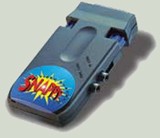
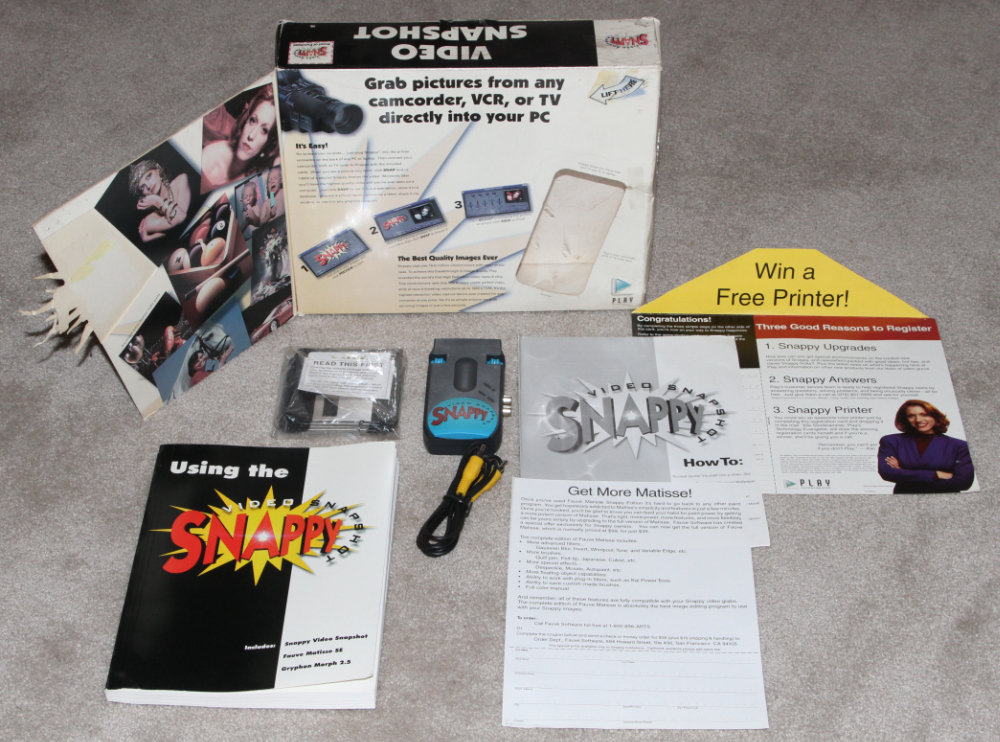

PLAY
SNAPPY - 1995. Video still
capture
device. The snappy and similar devices have the capability of
capturing
still images from various analog or digital moving image sources.
It
is a frame grabber that when plugged into a PC's parallel
port allows the user to capture images from a camcorder, to a computer.
The
grabbed frame can then be used to create screensavers, wallpaper,
desktop
publishing documents or graphics for a web site. We b
http://www.vintagecomputing.com/index.php/archives/754/retro-scan-of-the-week-snappy-video-snapshot
http://www.markrandall.com/about-mark-randall/startups/snappy-media-reviews/
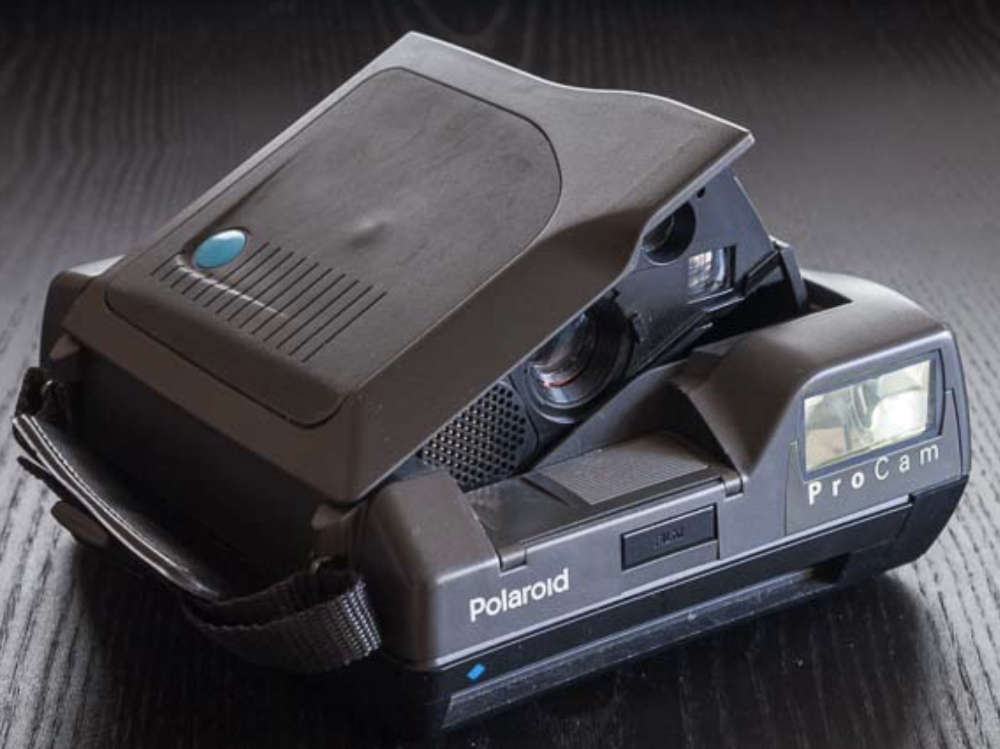
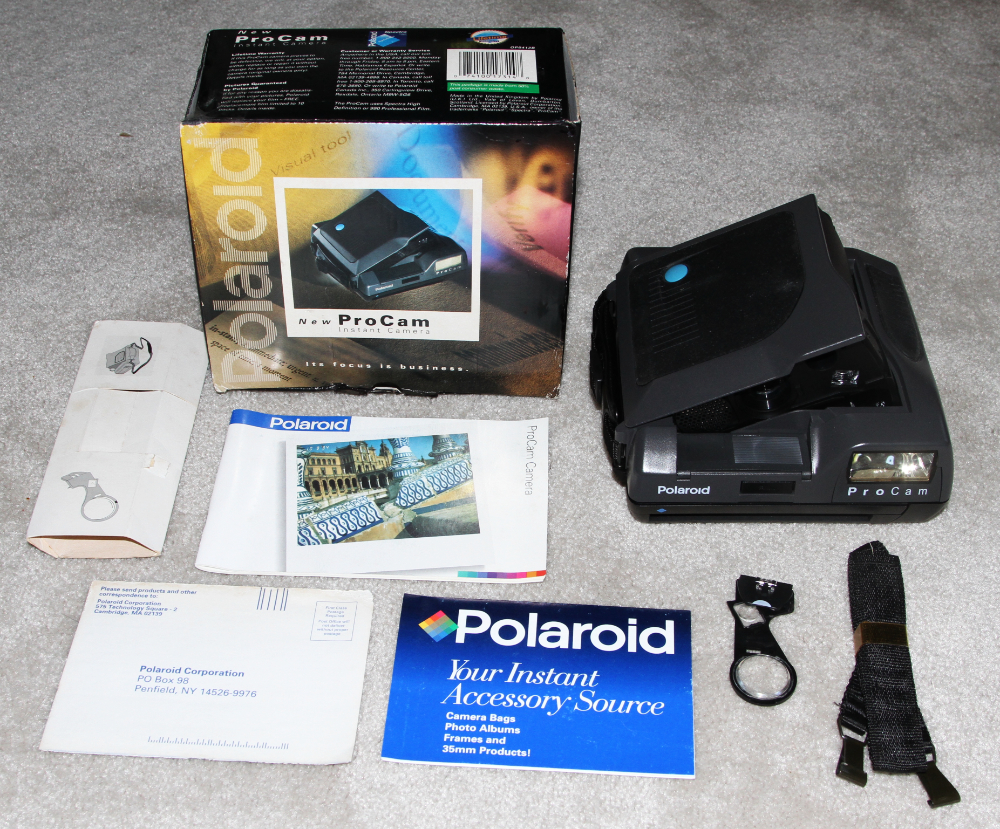

Polaroid ProCam - 1995.
The Polaroid ProCam was a professional wide-format instant camera in
the Spectra series. It allowed you to take photos in a variety of
lighting conditions, from cloudy to sunny. It featured a
high-quality, multi-element glass lens, unlike many other Spectra
models that used plastic lenses. Key features include Sonar autofocus
(with an enable/disable option), a built-in electronic flash (also with
enable/disable), exposure compensation control, and a tripod socket.
The camera also allowed for date and time imprinting on the photos. It
was designed to be rugged and portable with a strap for one-handed
operation.
https://cjo.info/polaroid/cameras/polaroid-procam/
https://en.polaroid-passion.com/manuel/manuel-polaroid-pro-cam.pdf
https://www.youtube.com/watch?v=PZ-gKXFgsck Video

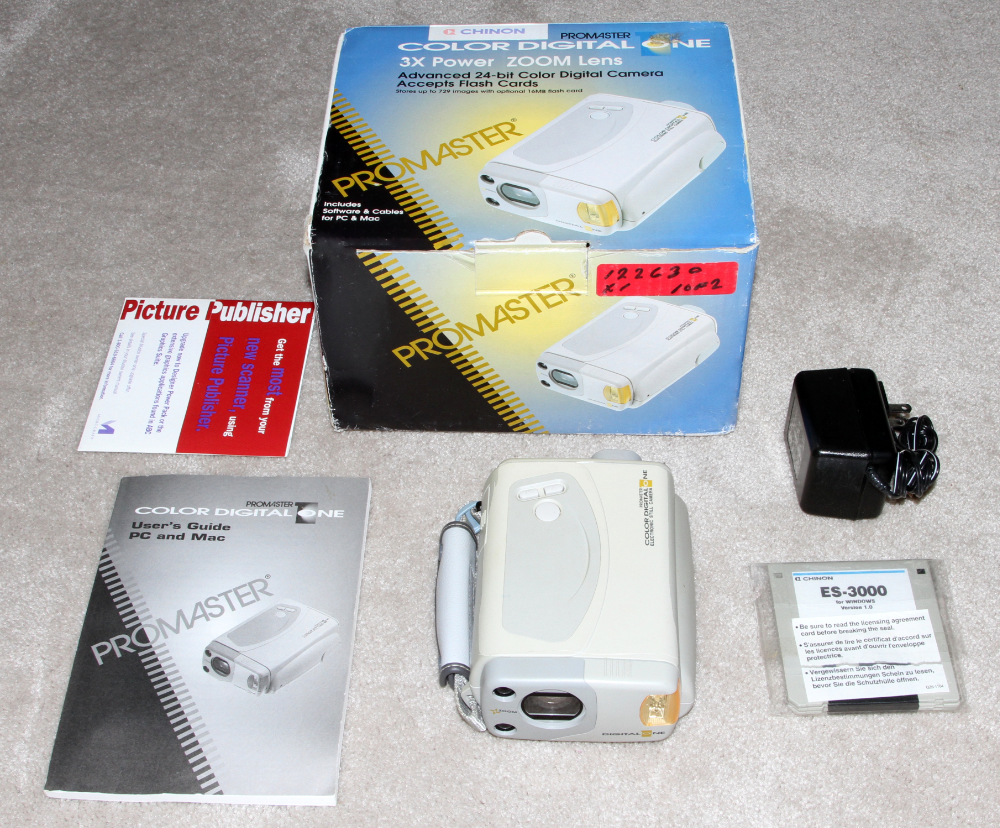

PROMASTER DIGITALONE (OEM Chinon ES-3000. Also sold as Kodak DC-50, Dycam 10-C, Quantaray/Ray Enterprises/Ritz DCC-9500) -
1995. 640 X 480 pixel CCD.
ISO
84. 38mm to 114mm zoom f/2.8 lens. Shutter 1/16 to
1/500
second. In-camera storage of 64-192 images. (The DigitalOne is Extremely Rare on U.S. eBay - we bought the only one we have ever seen))
https://www.digitalkameramuseum.de/en/cameras/item/promaster-digital-one
https://www.digicammuseum.de/gechichten/erfahrungsberichte/logi-fotoman-pixtura-iichinon/
http://camera-wiki.org/wiki/Dycam
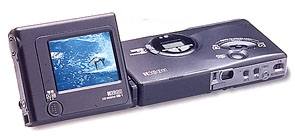
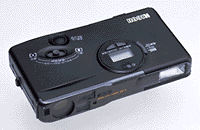

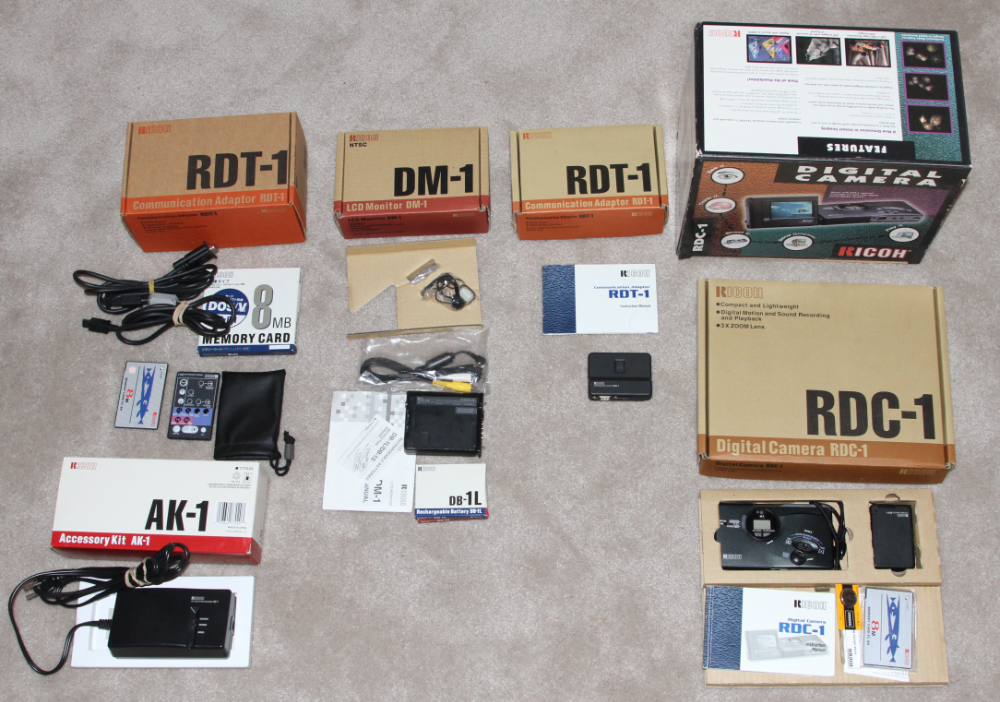

RICOH
RDC-1 - 1995. Boxes within boxes, within boxes. This outfit must have been rather intimidating for the unwary amateur photographer back in the 90's! The
RDC-1 was
the
first digital camera to offer both still and moving image and sound
recording/reproduction.
Its recording capacity on a 24MB PC card was 246 still pictures in
standard
mode, or 492 in economy mode, or 246 still images in economy mode each
with 10 seconds of sound, or 173 still images in standard mode each
with
10 seconds of sound, or four video scenes of 5 seconds each with sound,
or one hour and forty-five minutes of sound only. The DM-1
removable
2.5 inch color LCD monitor provided a live viewfinder image. 768
x 480 pixel CCD. 3X f/2.8 zoom. Approx. $1,800 MSRP, but we
got it for only $50 new in the box. (Rare on U.S. eBay)
http://www.epi-centre.com/reports/9604fhs.html
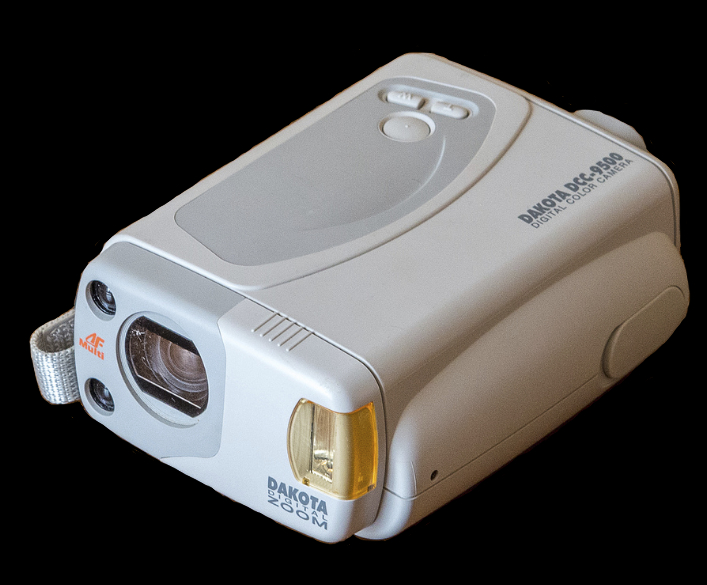


RITZ / QUNTARAY / RAY ENTERPRISES
DAKOTA DCC 9500 (Chinon ES-3000, Kodak DC-50, Dycam 10-C, Promaster DigitalOne) - 1995.
Distributed by Ritz Camera (also known as Ray Enterprises Inc).
640 x
480 pixel CCD. 3:1 zoom lens. Images were stored in 1MB
flash
memory on PC cards. They could be uploaded to a PC via serial
cable
using the supplied software. Built-in flash with manual and
automatic focus. The 3:1 power zoom lens had a focal length
equivalent
to that of a 38mm - 114mm zoom lens on a 35mm film camera. MSRP
$1000. Photo above
right of all five versions is by Maoby - saved me the trouble of
getting all five out of storage for a photo). MSRP
$699. (The Dakota DCC 9500 is extremely rare on U.S. eBay - we bought the only one we have ever seen)
http://camera-wiki.org/wiki/Ritz_Camera
https://www.digicammuseum.de/gechichten/erfahrungsberichte/logi-fotoman-pixtura-iichinon/
https://www.digitalkameramuseum.de/en/cameras/item/dakota-dcc9500
https://books.google.com/books?id=_lM3mdMJNHIC&pg=PA86&lpg=PA86&dq=RITZ+%2B+%22DAKOTA+DCC+9500%22&source=bl&ots=RBGjidYPSV&sig=L3ZtifOmnkG9GyRPgd78z22gUcU&hl=en&sa=
X&ved=0ahUKEwit9fbPkufYAhVJeawKHT29AbkQ6AEIWTAM#v=onepage&q=RITZ%20%2B%20%22DAKOTA%20DCC%209500%22&f=false
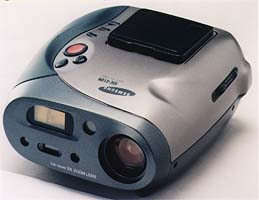
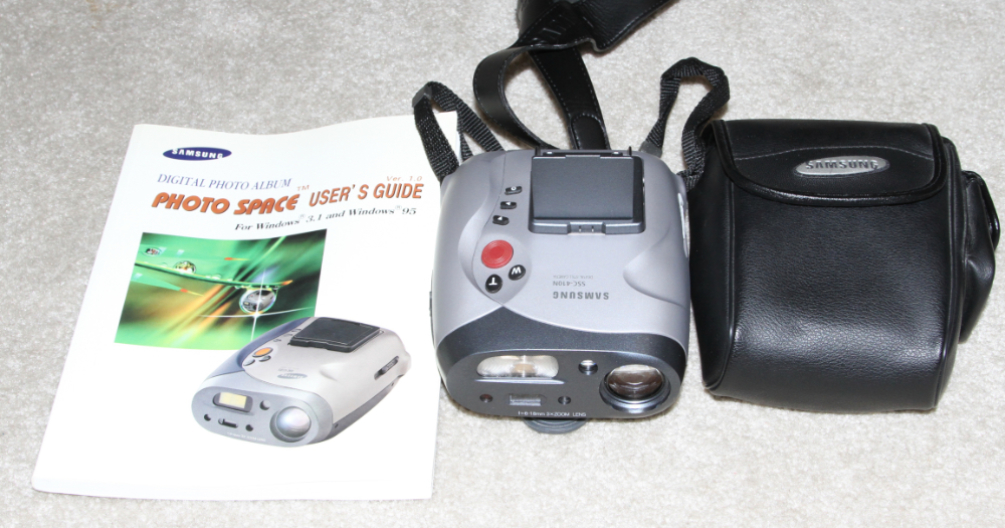

SAMSUNG
Kenox SSC-410N - 1995. Developed
in
1995/6, marketed in 1997. 1/3-inch, 768 x 484 pixel CCD.
4MB
internal memory. Lens 40mm to 120mm zoom. Shutter 1/60 to
1/10,000
second. Built-in flash. Burst of 4 frames in 1.5
seconds. The LCD was under a cover on top that fliped up with
side plates similar to many film twin lens reflex cameras. (Rare on U.S. eBay)
https://www.digitalkameramuseum.de/en/prototypes-rarities/item/kenox-prototype
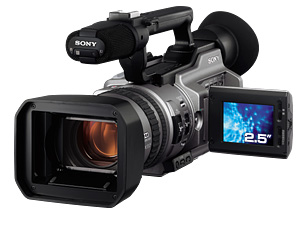

SONY DCR VX-1000 - 1995. The
DCR-VX1000 was the first camcorder to capture in the mini-DV (digital)
format, and the first with a FireWire port for transferring digital
video to a PC. Three 1/3-inch, 410K pixel CCDs. Regarded as a milestone
in the history of video recording. Thirty years old in 2025, and still many available on eBay. MSRP $6,000.
http://stringercam.com/articles/film_vs_video.html
FOR MORE INFO CLICK HERE
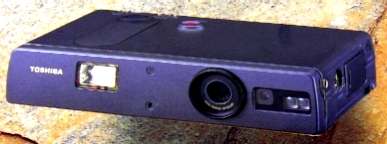
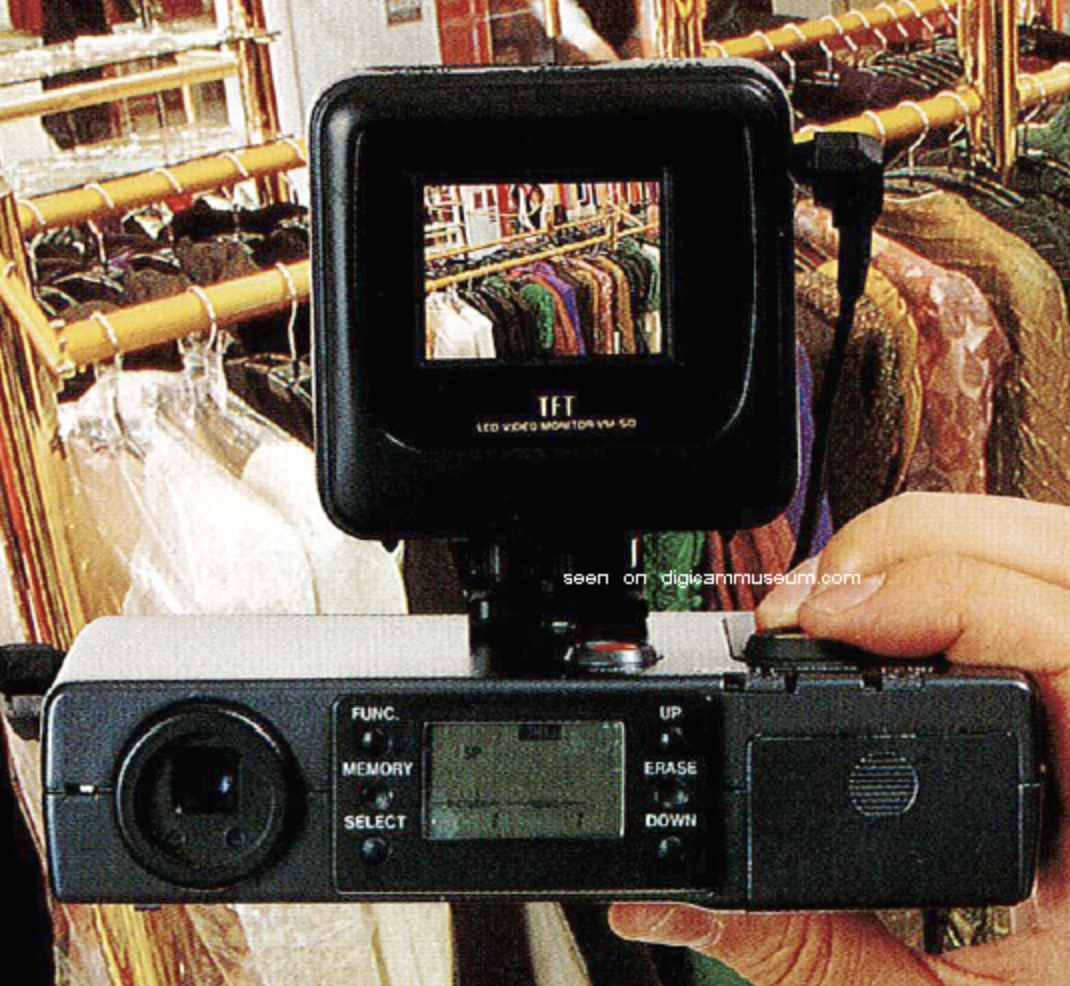

TOSHIBA
ProShot PDR-100 - 1995. 1/3-inch
640
x 80 pixel CCD. F/5.6 lens. Shutter 1/8 to 1/4000 second.
First
compact digital still camera equipped with a modem and communications
software
allowing users to transmit recorded digital images via standard
telephone
lines without any additional external equipment. Auto dial up to
ten numbers using fax modem card. This very rare photo provided
through
the courtesy of John Mehrmann, Toshiba Coporation. NOT MARKETED.
http://www.toshiba.co.jp/about/press/1995_08/pr0701.htm
https://www.digitalkameramuseum.de/en/cameras/item/toshiba-proshot-pdr-100



TOSHIBA SOLID-STATE FLOPPY DISK CARD (SMART MEDIA) - 1995. The
Solid-state Floppy-Disk Card (SSFDC) now called Smart Media, was one of
the earliest. It was introduced by Toshiba in 1995 when it was referred
to as the Solid State Floppy Disk Card. It is manufactured by a number
of companies, some samples of which are shown above. The
key difference between a SmartMedia card and a CompactFlash card is
that the controller chip is in the camera rather than in the
card. Digital Photography Answers, Dave Johnson, 1999, p278.
https://en.wikipedia.org/wiki/SmartMedia
1995
D-Z













































